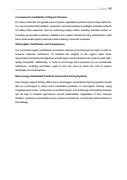P a g e | 35 4. Increase the Availability of Organic Produce For many customers, the greater price of organic vegetables continues to be a major deterrent. It is recommended that retailers, producers, and policymakers investigate potential methods of cutting these expenses, such as optimising supply chains, boosting domestic output, or providing government subsidies. Retailers and organic farmers forming partnerships could boost small-scale organic producers while lowering consumer expenses. 5.Strengthen Certification and Transparency It is crucial that organic certification procedures continue to be thorough and open in order to preserve customer confidence. To maintain the integrity of the organic label, these requirements should be strengthened and all organic products should be made to reach high- quality thresholds. Additionally, in order to encourage more producers to use sustainable techniques, certifying authorities ought to look into ways to lower the cost of organic certification for small farmers. 6.Encourage Sustainable Practices Across All Farming Systems Even though organic farming offers many advantages, conventional farming systems should also be encouraged to adopt more sustainable practices. In non-organic farming, using integrated pest control, cutting back on synthetic inputs, and enhancing soil health techniques can all help to increase agriculture's overall sustainability. Regardless of their financial situation, customers would always have access to wholesome, eco-friendly produce thanks to this strategy.
